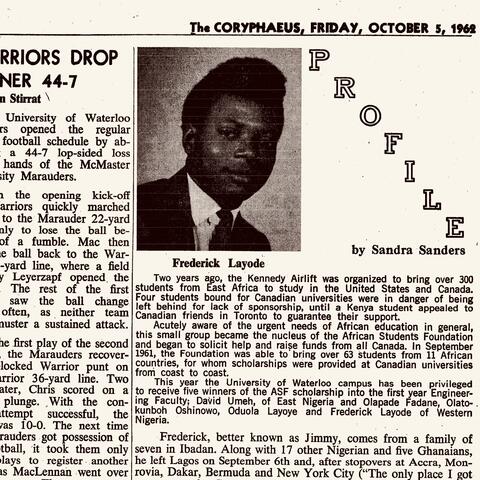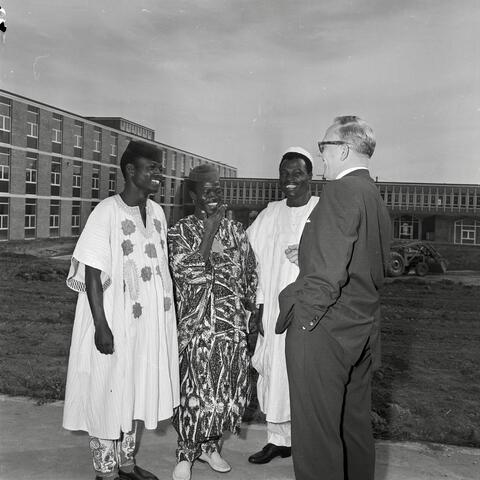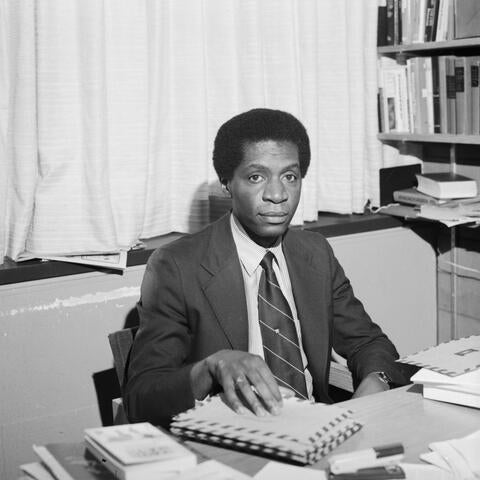Early this year in a conversation about marking Black History Month at University of Waterloo, History professor Christopher Taylor raised the question about Black history at the University. "I know work has been done on Waterloo region's Black history," Taylor said, "but what about specifically at the University? Who was the first Black prof? Who were the first students? What are the achievements by Black folks on campus? What about protest and resistance?"
The conversation also prompted Taylor to stress that any month is the right month to learn from and reflect on Black history. "I'm a firm believer that Blackness doesn't end on February 28/29, and these stories should be year-round."
Taylor has just been appointed Associate Vice President, Equity, Diversity, Inclusion and Anti-Racism for the University, and is a founding member of Waterloo's Black Faculty Collective. Within the Department of History, he works with research assistant, Jonathan Zi En Chan.
Knowing that researching and documenting Black history at Waterloo could be a big project and should not be rushed, Taylor asked Chan to begin the work. Their intention was to research the presence of Black students, faculty and courses at Waterloo, and disseminate the findings, once ready, in The Sankofa Journal of Interdisciplinary Studies, a new open-source journal founded by Taylor. In the meantime - because any time is the right time to talk about Black history -they are sharing highlights from the research to date.
Chan, who is a PhD candidate in History, found that Black students and several notable Black faculty members were at the University of Waterloo since the early 1960s. "The campus was often filled with the students' vibrant activity and advocacy," he says, "while the faculty members pioneered the first courses on African and Black studies." At that time, he adds, most Black students came to the university as international students from African countries. Chan writes:
Black student experiences
 In 1962, the University participated in the Kennedy Airlift, a movement started three years prior by a Kenyan named Tom Mboya to support Kenyan students' post-secondary education in Canada and the United States. Waterloo welcomed five students from Nigeria, all of whom won a scholarship from the African Student Foundation, which organized the Airlift initiative in Canada. The campus student newspaper (then called The Coryphaeus) chronicled Black student activities and experiences on campus, including their hopes, dreams, and fears for their futures and home countries as they treaded down the path of decolonization.
In 1962, the University participated in the Kennedy Airlift, a movement started three years prior by a Kenyan named Tom Mboya to support Kenyan students' post-secondary education in Canada and the United States. Waterloo welcomed five students from Nigeria, all of whom won a scholarship from the African Student Foundation, which organized the Airlift initiative in Canada. The campus student newspaper (then called The Coryphaeus) chronicled Black student activities and experiences on campus, including their hopes, dreams, and fears for their futures and home countries as they treaded down the path of decolonization.
However, by the late '60s, the University had difficulty accommodating accepted Black and other international students as Canadian public opinion shifted. International students were viewed not as people who could benefit from Canadian education, but as parasites who took up valuable enrollment quotas from their children. This problem was intensified with the Sir George Williams affair in 1969 at present-day Concordia University - when students occupied a computer lab protesting racist marking. The incident was widely attributed by media to slack immigration laws, and Caribbean students in particular were demonized as troublemakers.
In 1970, Waterloo's Chevron student newspaper ran an editorial calling on the University to "Canadianize" and protect itself from foreign influences. One of the paper's recommendations to the government was to "review its policy on foreign graduate students … whether the cost of their education is to be regarded as international aid … and they should be required, upon graduation, to return to their country of origin…".
 Despite periods of antagonism from certain segments of the campus, Black student associations strived to create lively and vibrant space for their members. In addition to creating a place of belonging for their members, the African Student Association (ASA) and the Caribbean Student Association (CSA - now the Association of Caribbean Students) often jointly hosted symposiums that invited scholars and government officials from the African Continent and Caribbean to give talks on decolonization, which also engaged the wider student body. This intercultural engagement may have encouraged many Waterloo students to join humanitarian exchange trips to the African Continent hosted by various organizations, such as Crossroads and CUSO. Both Black student associations often advocated for the concerns of the Black student body. In 1975, for instance, a Chevron editorial by ASA president Oye Ibidapo Obe spoke up against foreign students being considered tourists rather than being issued student visas.
Despite periods of antagonism from certain segments of the campus, Black student associations strived to create lively and vibrant space for their members. In addition to creating a place of belonging for their members, the African Student Association (ASA) and the Caribbean Student Association (CSA - now the Association of Caribbean Students) often jointly hosted symposiums that invited scholars and government officials from the African Continent and Caribbean to give talks on decolonization, which also engaged the wider student body. This intercultural engagement may have encouraged many Waterloo students to join humanitarian exchange trips to the African Continent hosted by various organizations, such as Crossroads and CUSO. Both Black student associations often advocated for the concerns of the Black student body. In 1975, for instance, a Chevron editorial by ASA president Oye Ibidapo Obe spoke up against foreign students being considered tourists rather than being issued student visas.
Black faculty experience
Some of the earliest hires of Black professors at the University of Waterloo in the 1960s had lasting impacts on the community and the world. The first Black professor at Waterloo is Dr. Locksley Edmondson, an assistant professor in Political Science. He taught from 1963 to 1967 before taking a leave of absence to teach in Makerere University in Uganda. Edmondson returned to North America in the early 1970s and eventually took up a position at Cornell University where he became the director of African Studies.
Dr. Donald M'Timkulu, was hired in the late 1960s as a professor of Sociology at Renison College. He was a popular teacher best known for his courses on Race and Culture In the Third World. M'Timkulu also established the beginning of the Applied Social Science program that eventually became Renison's School of Social Work. In addition to teaching, M'Timkulu was the director of the Mindolo Ecumenical Centre, an active participant at the University of Waterloo's CUSO committee, and part of many African Studies societies.
 Dr. Karl Bennett, born in Jamaica, was an Economics professor until 2002, and was department chair from 1981 to 1987. Bennett served on multiple committees throughout his tenure at Waterloo, such as the Government of Canada Treasure Board in 1971 and 1982, Ontario Premier's Council on Economic Renewal in 1991 to 1995, and UN Caribbean Regional Integration Advisory Team in 1975. To this day, Bennett remains an active member in the Caribbean Canadian Association of Waterloo Region which grants scholarships to promising students of Caribbean heritage. Dr. Bennett serves as an adjudicator of the scholarship committee.
Dr. Karl Bennett, born in Jamaica, was an Economics professor until 2002, and was department chair from 1981 to 1987. Bennett served on multiple committees throughout his tenure at Waterloo, such as the Government of Canada Treasure Board in 1971 and 1982, Ontario Premier's Council on Economic Renewal in 1991 to 1995, and UN Caribbean Regional Integration Advisory Team in 1975. To this day, Bennett remains an active member in the Caribbean Canadian Association of Waterloo Region which grants scholarships to promising students of Caribbean heritage. Dr. Bennett serves as an adjudicator of the scholarship committee.
Black Studies
The University of Waterloo has a long but often-forgotten history of offering courses on African and Black-related studies. In the 1960s, courses appeared in multiple departments. The History department offered a single course in African History which expanded two courses Ancient and Pre-Colonial Africa and Colonial and Independent Africa. Many of these courses were taught by Dr. Raymond Beachey. The Anthropology department also offered a course called Peoples of Africa in the late 1960s.
The selection of courses on Black studies continued to expand throughout the 1970s. Dr. M'Timkulu at Renison College started teaching Race and Culture in the Third World, which was popular well into the 80s. The Political Science department also offered a course on The Third World that was available until the late 1970s. Several other departments such as Anthropology began offer more courses, including Cultures of West Africa and Anthropology of Race and Racism in Canada.
In the 1970s, Dr. James Walker joined the History department and greatly expanded the repertoire of courses offered in that program. He developed the course Black History in North America, the first of its kind in the country. Together with Dr. Beachey, Walker offered a course on Problems in African History, which later became East African History. In an interview with Walker, he suggests that African decolonization, the momentum of Black Power, and Civil Rights movements greatly contributed to a growing interest in Black studies. This was reflected in course offerings and enrollment across various departments at the University of Waterloo.
By the 1980s, there was a shift in course content from African studies to race relations. Walker's research led him to change the themes of his courses from African history to race relations, and finally to anti-racism - for instance, his course Race Relations in Canada. The shift also reflects a growing awareness of and interest in the force of Black Power movements and Africa as it emerges in the post-colonial world. On the campus, students of all ethnicities were engaged in the discourse.
While the University of Waterloo has had a variety of courses on Black studies since the 1960s, there were and remain few Black faculty to teach these courses. Even in the case of the History department, home to the largest course offerings on Black studies, there has never been a tenured Black professor.
PHOTOS: 1. Banner, left to right, Douglas V. Gonder, honorary doctor of laws, Gen. A.G.L. McNaughton, honorary doctor of engineering, Oluremi Balogur, graduating engineer, Dean Douglas Wright, and Chukuma Nwachuko, graduating engineer. 2. Clipping from student newspaper The Corphaeus, 1962. 3. Left to right, Nigerian engineering students Adesanya Akadri, Oluremi Balogum, and Samuel Ilechukwu with Dean Douglas Wright. 4. Professor Karl Bennett. Photos 1, 3, and 4 courtesy of Special Collections and Archives, University of Waterloo Library.






